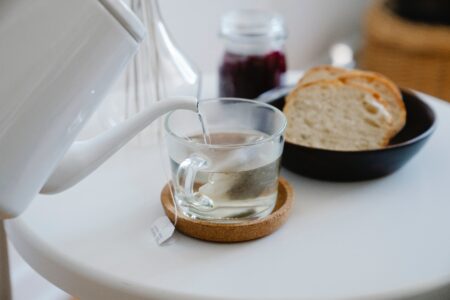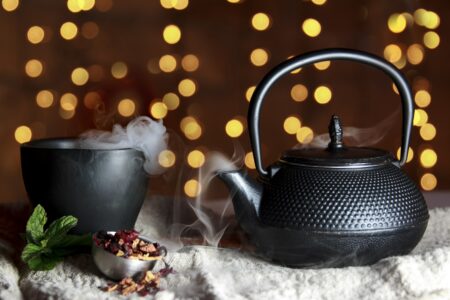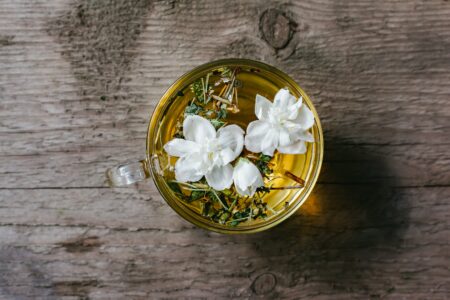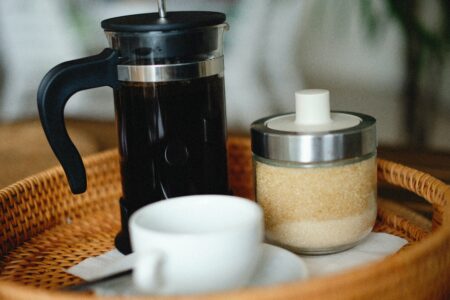What Temperature Should You Brew Your Tea At?
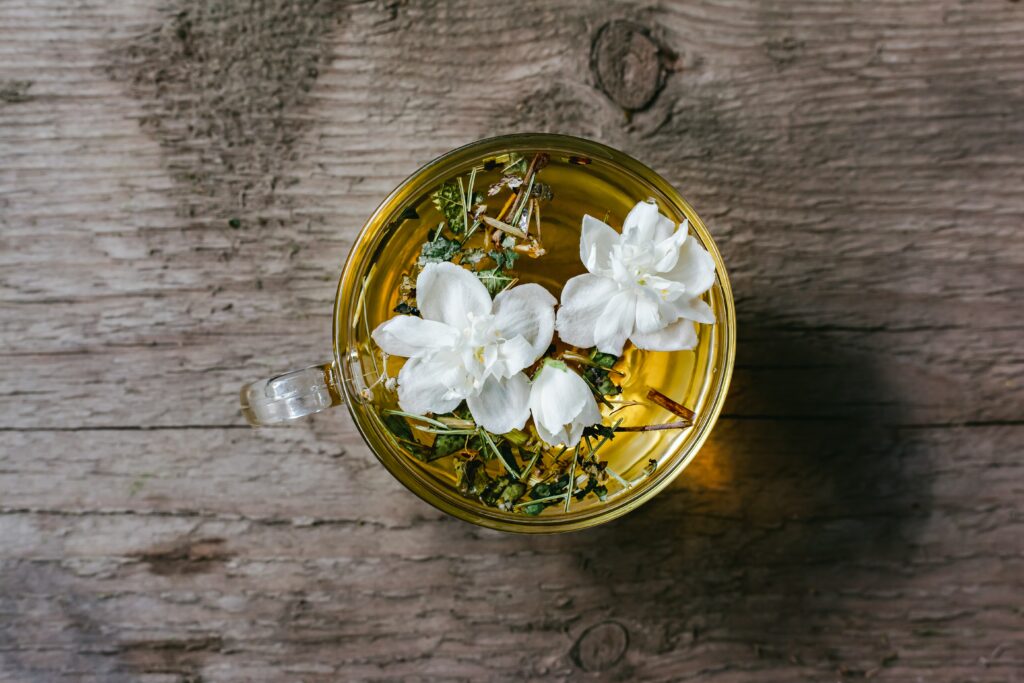
Brewing the perfect cup of tea is no easy task. The temperature at which you brew your tea can make a huge difference in how it tastes, and while getting it right requires some trial and error, having a few guidelines to start with can help ensure that your mug of deliciousness won't disappoint.
In this blog post, we'll explore what variables affect the ideal brewing temperature for different types of tea, so that you can create perfectly balanced drinks every time. From delicate blooming teas to robust pu-erh teas, here are all the tips and tricks you need to know about brewing at just the right temp. Let's get started!
How does temperature affect the tea you brew?
Ah, tea. We all know the warmth and comfort that comes with sipping a hot cup of your favourite brew. But have you ever stopped to think about what exactly is happening when you add hot water to your tea? Temperature can play a major role in how successful your cup of tea turns out, so if you're looking to get the very best flavour from every cup, it might be worth taking a closer look at why temperature matters for brewing the perfect cuppa.
Brewing tea at too high of a temperature can lead to a bitter, astringent taste, while brewing it at too low of a temperature can result in a weak cup of tea with no flavour. The ideal brewing temperatures for different types of tea vary based on their origin and type. Here's a handy guide for what temperature to brew each type of tea:
Brewing different types of tea
Here's a quick summary of what temperature you should brew each type of tea at:
- Green Tea: Brew at 75-80°C and steep for 1-3 minutes.
- Black Tea: Brew at 95-98°C and steep for 2-4 minutes.
- English Breakfast Tea: Brew at 95-98°C and steep for 2-4 minutes.
- Oolong Tea: Brew at 82-96°C and steep for 3-4 minutes.
- White Tea: Brew at 74-80°C and steep for 1-3 minutes.
- Chai Tea: Brew at 98°C and steep for 5 minutes.
- Earl Grey Tea: Brew at 98°C and steep for 3 minutes.
- Pu'erh Tea: Brew at 85-98°C and steep for 3 minutes.
- Jasmine Tea: Brew at 85°C and steep for 2 minutes.
- Herbal Tea: Brew at 95-98°C and steep for 5 minutes.
- Rooibos Tea: Brew at 95-98°C and steep for 2-3 minutes.
Green tea
Green tea has become a popular beverage around the world due to its many benefits. It's made from the leaves of the Camellia sinensis plant, which is native to East Asia. The leaves are withered, steamed, rolled and dried depending on how they will be processed later. When brewed, green tea has a light yellow-green colour and a slightly grassy or vegetal flavour that is often enjoyed with a little bit of honey or sugar.
Brewing green tea can be quite a challenge if you're unfamiliar with the process. But with some practice and a little bit of patience, you can become a brewing expert in no time! As a starting point, make sure to always use filtered water with preferably no chemicals added, as these could negatively affect the taste of your tea.
Make sure to heat the water to a temperature that's suitable for green tea; Brew at 80 C and steep for 1-3 minutes for the perfect flavour. Finally, brew for two minutes only - adding more time will again riddle your cup with a bitter taste from over-extraction. With all this taken into account, your decision on whether to enjoy it hot or cold is completely up to you!
Black tea
Black tea is the most popular type of tea in many parts of the world, and it's made from the same Camellia sinensis plant as green tea. However, it's processed differently; The leaves undergo a more extensive oxidation process which gives black tea its characteristic dark colour and robust flavour. Black teas tend to be stronger than both green and oolong teas, so they're usually enjoyed with milk or sugar.
Brewing black tea is quite straightforward. Heat your water to 100 C, and let it steep for 2-4 minutes depending on how strong you like it. This will give you a cup of bold, full-bodied tea that's sure to satisfy even the most ardent tea drinkers. Plus you can rest assured that the notion of 'too much tea' only applies if you're drinking over 5 cups a day, and even then the impact to health is negligible for most people - so sip away and enjoy.
Oolong tea
Oolong tea is a traditional Chinese tea that sits somewhere between a green and black tea. It is made from the buds and leaves of Camellia sinensis and can range from light and floral to a dark and roasted taste that’s rich and complex in flavour. The way oolong is produced has a lot to do with the flavour profile as well. Oolong undergoes a partial fermentation process which helps bring out its many layers of taste unlike green tea or black tea.
Brewing oolong tea requires a bit more attention than black or green tea. Make sure the water is between 82 and 96 C and steep it for 3-4 minutes to get the most out of its flavour. Oolong teas are best brewed in a ceramic vessel, as this helps maintain the temperature better and will bring out the tea’s natural sweetness.
White tea
White tea is one of the most gentle yet flavorful varieties of tea. It is made from the unopened buds and young leaves of the Camellia sinensis plant and undergoes minimal processing compared to other teas. This means that it has higher levels of antioxidants as they are retained better than with other types of tea.
For brewing, you need to use hot but not boiling water to ensure maximum flavour and aroma retention - around 74-80 degrees Celsius should be sufficient depending on your personal preference. Use a generous amount of white tea leaves per cup (2g -3g) and steep for 1-3 minutes until the desired strength has been reached. If the taste is too light for your liking, don't increase steeping time as this can lead to bitterness; instead, simply add more tea leaves when making your next cup.
Chai tea
Chai tea is a spiced, full-flavoured black tea that originated in the Indian subcontinent. It often contains ginger, cardamom, cloves, cinnamon and sometimes even star anise or fennel. To make a cup of chai tea, it is best to start with a quality black loose-leaf tea; this will provide the utmost flavour and aroma. To brew the perfect cup of chai drinkers should use 1 teaspoon per 8oz / 250 ml of 98-degree water. Let the leaves steep for 3 minutes and pour through a sieve or strainer into a teacup or mug. Add your favourite sweetener (such as honey or sugar) to taste. Enjoy!
Earl Grey
Earl Grey tea is one of the most popular teas in the world. It is a black tea that has citrus overtones and a unique flavour that can only truly be appreciated by those who take the time to prepare it properly. For brewing, use 1 teaspoon per 250ml of 98-degree water. Steep for 3 minutes, then strain and serve with or without milk and/or sweetener depending on your preference.
Pu'erh tea
Pu'erh tea is a unique type of fermented post-oxidized tea from Yunnan Province in China. It's gaining popularity in the West for its earthy, yet sweet and smoky flavour, as well as its purported health benefits such as aiding digestion and weight loss. Before trying Pu'erh tea, it’s important to understand how to prepare quick and tasty cups.
This method requires oolong tea leaves (other varieties of Pu'erh are available, too) and hot water at 100°C. Steep one teaspoon of leaves per 250ml of hot water for two minutes when first trying the tea, then experiment with your favourite brewing methods. An inexpensive and simple Chinese teaware called a Gongfu cha is my recommended tool but any teapot or even a mug will do the job just fine!
Jasmine tea
Jasmine tea is a unique beverage that combines the fragrant aroma of common jasmine flowers (Jasminum officinale) with the smooth flavour of green tea leaves. Traditionally, Jasmine tea is brewed using two steps: first, jasmine flowers are placed in a teapot with dry green tea leaves, allowing their scent to infuse into the leaves for several hours. 85°C water is poured over the leaves and it's then left to steep for 2-3 minutes, infusing them with a delicate floral flavour. When brewing properly, Jasmine tea offers an unparalleled subtly sweet taste profile that delights both novice and expert tea drinkers alike.
Herbal tea
Herbal tea is an infusion made from dried herbs, flowers, fruits and spices. The beauty of herbal teas lies in its versatility — you can create your own recipes and tailor them to your taste. To make a cup of herbal tea, steep 1 teaspoon of dried herb for 5 minutes in 95-98°C hot water (boiling water should not be used as it can destroy the delicate flavours and nutrients). Experiment with different herbs, fruits and spices to find a blend that best suits your taste. The options are limitless!
Rooibos tea
Rooibos tea, also known as red bush tea, is an herbal beverage made from the shrub Aspalathus linearis that is popular in South Africa. It has a light, earthy and sweet flavour with no caffeine and it's high in antioxidants. To make a cup of Rooibos tea use 1 teaspoon per 250ml of water heated to 98°C. Steep for 3-5 minutes and strain. Enjoy your cup of Rooibos tea with or without milk, sugar or honey to taste.
Breakfast tea
Breakfast tea is a classic, robust blend of black teas that originates from various estates and has been a staple of the British home and workplace since the days of the British Empire. Typically, it includes teas from India, Sri Lanka, and sometimes Kenya and China. It's best known for its strong, bold flavour and dark colour, designed to invigorate and energise in the morning, traditionally served with milk and sugar. This tea is best brewed with boiling water, around 98°C.
Use one teaspoon of leaves per 250ml of water and allow it to steep for around 4-5 minutes. The resulting brew is a hearty tea, perfect for kick-starting your day.
Milk or sugar first?
Breakfast tea provides a pleasant, stimulating start to your morning and there is much debate regarding the behaviour of adding milk and sugar to it. Ask any tea aficionado and the answer is likely to be that the order in which these additions are made makes a difference.
For those with a delicate palate, milk should be added first or else the taste of tea may become impaired by the sugary texture of the milk. This helps ensure that each sip of your tasty beverage brings forth all its flavour with an even balance. On the other hand, for those who like their tea really sweet, adding sugar first will give you sweeter results than if sugar was added after the milk has been added.
How to avoid bitter tea
Many tea lovers know that brewing tea can be a tricky balancing act! If it's brewed for too short, you’ll end up with a weak flavour. If it’s brewed for too long, however, your tea could be overly bitter. Thankfully, there is an easy way to avoid this bitter taste and create the perfect cup of tea each time. When timing how long to steep your tea, start with 2 minutes as a guideline and taste it every 30 seconds until it reaches the flavour you like best. Additionally, brewing your tea at under 98°C will help reduce bitterness while still allowing the full aromatic potential of the beautiful tea leaves to develop.
Conclusion
In conclusion, knowing the optimal temperature for tea brewing is essential for unlocking the flavorful and aromatic potential of your tea. While some proponents suggest steeping times should be reduced with hotter water, there is a balance to be had between ensuring you get a hot, yet enjoyable brew.
Ultimately, it's all down to personal preference. That said, keeping in mind the number of factors at play here, it’s always good practice to start off with lower temperatures, generally between 85-95 degrees Celsius. Then experiment to find the perfect temperature through trial and error. With this method, it shouldn’t take long to discover how best to produce your own perfectly brewed cup of tea.
Did you know you can change the temperature of our boiling water taps at the push of a button? Our touch-screen boiler allows you to set your tap to between 75 and 98C. Find out more about how a boiling water tap works.
